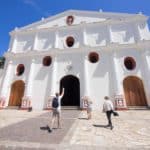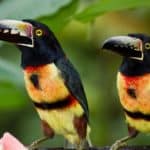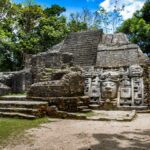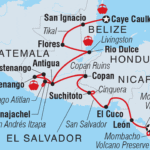Nicaragua to Belize Discovery
Take a 24-day adventure into the heart and mind of Central America – hitting all the must-see spots, as well as hidden gems, in Nicaragua, El Salvador, Honduras, Guatemala and Belize. See the crater lake and cloud forest of Mombacho Volcano, tour Maya ruins at Copan archaeological site and Tikal National Park, cruise on Lake Atitlan and learn all about the fascinating deity San Simon. There are colourful markets to visit (via chicken bus, of course), historic cities to wander and nature reserves to revel in. Explore optional activities in Antigua, learn some Spanish so you can chat to the diverse locals and then kick back in Caye Caulker, where you end the journey on white sands surrounded by snorkelling opportunities and lazy, beach lifestyles.
24 days, from
$3,588
per person
GROUP SIZE
ACTIVITY LEVEL
Details
Countries Visited:
Belize
El Salvador
Guatemala
Honduras
Nicaragua
Accommodation: Hotel (21 nights), Lodge (2 nights)
Transportation: Private vehicle , Local bus , shared boat , ferry , Taxi
Included Meals:
- 15 breakfasts
- 5 lunches
- 2 dinners
Group size: Minimum 1, Max 16
Minimum Age: 15
See the lava flow and crater at Masaya Volcano National Park – the first and largest national park in Nicaragua and a fascinating place to explore.
Take a guided tour of the Copan ruins and archaeological site – a UNESCO World Heritage site and one of the most important sites of the Mayan civilisation.
Take a scenic boat ride on Lake Atitlan to Santiago Atitlan, with 95% of the population of Mayan descent, and meet the shamanic keepers of Maximon and share a bottle of local spirits with them as they tell you stories of local life.
Gaze in wonder at the jungle-shrouded limestone temples of Tikal National Park – one of Central America's most impressive Mayan sites, as howler monkeys call from the canopy.
Relax and recharge on the white sands of Caye Caulker, a tiny Belizean island made for beach BBQs, snorkel trips and lazy afternoons spent swinging in a hammock.
Itinerary
Hola! Welcome to Nicaragua. Your adventure begins in the oldest city in the 'New World'. Featuring Moorish and Andalusian architecture and oozing colonial charm, Granada is set on Lake Nicaragua’s banks and surrounded by active volcanoes. Your trip starts with a welcome meeting at 6 pm at your hotel today. If you arrive early, why not stroll around the largest lake in Central America? Lake Nicaragua is the only freshwater lake that has oceanic animal life. Tonight, enjoy an optional group dinner with your fellow travellers.
This morning, you’ll hop on a private minibus and start your journey towards Leon. Along the way, visit the Masaya Volcano National Park, famous for the lava flow in the Santiago Crater and the largest national park in Nicaragua. View the famed lava flow and, if you like, take a short walk on one of the trails. This crater is thought to be over 9000 years old! After, continue your journey, stopping at the Monimbo artist village. Meet with a local artisan who makes the traditional masks used during the revolution. Get to know the artist and learn about the significance of the masks, how they are created and the Indigenous perspective of the revolution. Then head to the local market that is at the center of daily life in Monimbo where you'll enjoy an included lunch of local specialties. When you arrive in Leon, your leader will take you on a walking tour of this charming city. Though it's the second largest in the country, Leon is relatively free of tourists, making strolling the mural-lined streets an absolute pleasure.
Make the most of Leon in the morning by exploring the city at your leisure. The street food behind the Lady of Grace Cathedral is some of the best in town, so why not grab a 'Nica taco'? Made with maize, rolled and then deep fried, these beauties are usually served with shredded cabbage and smothered in cream. Maybe take a kayaking tour at Juan Venado Island Nature Reserve – float along the waterway between the mangrove forest and the island’s coast and watch out for wildlife that live here in abundance. Otherwise, a thrilling volcano sandboarding adventure could be just the thing for the adventure seekers out there.
Prepare for a long driving day today as you cross into Honduras, then to El Salvador to get to your overnight stop. Along the way, your leader will engage you in an absorbing discussion about life and challenges for modern Central Americans.
You have a free morning in El Tunco. Maybe take an optional surf lesson or spend time on the beach. This afternoon, you’ll head to Suchitoto. If you have ever been to El Salvador, you have most likely tried the national dish – pupusas – a thick cake or flatbread made with cornmeal or rice flour. Now you can learn how they’re made with an evening workshop with your group. The ingredients can be found worldwide, so if you want to make your own pupusas when you get home, you’ll enjoy this hands-on experience!
Begin the day with a guided orientation walk of Suchitoto – widely considered the cultural capital of El Salvador. Stroll past gorgeous colonial facades and get your bearings. Birders will want to crane their necks as Suchitoto lies on a bird migration path, providing the perfect opportunity to spot your fine feathered friends. The rest of the day is yours to explore the optional activities. Suchitoto overlooks the Embalse Cerron Grande, also known as Lago Suchitlan. This man-made freshwater reservoir is a haven for the migrating birds, particularly falcons and hawks. Maybe grab a historically minded group (of 3 or more) for a guided walk through Cinquera Forest, where guerrilla fighters used the forest as cover during the civil war.
This morning drive to Copan in a private transfer. With breathtaking scenery, it's another excellent opportunity to grab a window seat. Arrive in the charming town of Copan in the early afternoon. While most people use Copan as a base to explore the nearby ruins, there are plenty of other points of interest, both along the cobblestone streets and set into the lush surroundings. Maybe get started in the Central Plaza and follow your nose to a café. Alternatively, head to the Macaw Mountain Bird Park – a bird rescue, rehabilitation and release centre, this nature reserve is on ten acres of forested land, surrounded by streams and very close to the ruins. Tonight, rejoin your group for a traditional Honduran dinner of Baleadas – these Honduran tacos are made with flour tortillas and stuffed with various ingredients, depending on the season, like refried beans, cheese, avocado and cream.
Head out early on a guided visit to the Copan archaeological site. These magnificent Mayan ruins were declared a UNESCO World Heritage Site in 1980. Discovered in 1570 by Diego García de Palacio, this continues to be one of the most important sites of the Mayan civilisation. Take your time and enjoy exploring the most important cultural destination in Honduras. The rest of your day is free, so you can visit the bird park if you didn't get to yesterday. Tonight, why not visit the nearby natural hot springs. This optional tour gives you hours of soak time in the mud, steaming natural baths and refreshing pools in the lush jungle, with an included dinner.
This morning, hop in a private transfer and cross into Guatemala, arriving in Antigua in the afternoon. Check into your hotel and relax, before meeting up with your group for a farewell dinner of shucos – a popular Guatemalan street food like a hot dog, but with toasted bread and guacamole.
Enjoy a free day to explore the city, with nothing scheduled until a meeting to welcome any new travellers joining you on your adventure. Maybe grab some roasted beans from a street vendor and munch them while you stroll around. If you’ve got a historical bent, perhaps check out the 18th-century ruins of the Monastery of Santa Clara.
This morning after breakfast, travel to San Andres Itazapa in Chimaltenango. The Guatemalan Highlands are the best place to see the result of Mayan culture and Catholic religion coming together. Witness the unique culture firsthand with a shamanic ceremony at the Temple of San Simon. San Simon, the chain-smoking saint also known as Maximon, is a somewhat morally ambiguous deity. As few Mayan gods survived Spanish colonialism, scholars now think that San Simon is a symbol of numerous lost deities. After leaving your rum or tobacco offering (which can be purchased at the on-site liquor store), you’ll stop for a group lunch, before heading to Las Fuentes Georginas – volcanically heated hot springs in Xela. Surrounded by ferns, these luxurious hot springs are also the entrance to the forest reserve, with trails to the Zunil volcano. When you start to prune, you’ll carry on Quetzaltenango, where you spend the night.
This morning after breakfast, you’ll hop on a chicken bus – a truly local experience, chicken buses are a source of national and personal pride. This popular transport option unique to Guatemala has little to do with actual chickens – they are old American school busses passed down to new owners who decked them out in bright colours and decorations. Each bus is unique to the independent driver, many of whom have made this their sole business. The chicken bus will take you to a local market – Almolonga – famed for its giant vegetables, which some believe were blessed by God. Whether you believe the vegetables are a gift from above or due to the high amounts of fertiliser used by locals, this colourful market is a great place to rub shoulders with the locals and maybe pick up a giant carrot.
As Guatemala is home to many markets, today’s adventure is a great contrast to yesterday’s Almolonga. After breakfast, you’ll head to Chichicastenango market (nicknamed Chichi), home to textiles, wooden handicrafts and jade jewellery. This is one of the largest outdoor markets in Latin America and Guatemala’s most historic. Surrounded by mountains, you’ll explore the market with an expert local leader who knows all the best spots and walk among thousands of locals and tourists who hit these stalls weekly. Maybe grab some souvenirs or a huipils for yourself – a traditional garment worn by the Indigenous girls and women of the area. You can also pick up some handmade jewellery, pottery, incense, tablecloths, a ceremonial mask used in traditional Mayan dances or some leather goods. Tonight, spend the night in Panajachel on the shores of Lake Atitlan, where you’ll have a free evening for dinner.
This morning after breakfast, head for hop on a boat (called a lancha) on Lake Atitlan – surrounded by volcanoes, rolling hills and Mayan villages, this is definitely one of the most beautiful lakes in the world (as said by Aldous Huxley). Take the scenic ride to Santiago Atitlan, taking in the sweeping views from the water. Although this is the largest town on the lake, it sees far fewer tourists, making it the perfect spot to find authentic Guatemalan people, culture and activities. Here, you’ll visit the current shrine of Maximon (San Simon), where the local shamans keep watch. Your group will bring a gift of local spirits to share with the shamans, and while you drink, you’ll discuss the holy shrine, the perplexing deity and local life on the lake. Tonight, take a minibus back to Antigua.
Lucky you! Today is another free day in Antigua to explore all that this charming and historical city has to offer. Why not get a taste of local tradition with a chocolate-making workshop in the ChocoMuseo, or strut your stuff with a salsa dance lesson? Tonight at 6 pm, meet in the hotel lobby for a meeting to welcome any new travellers joining the trip. Then head out for an optional group dinner.
As the seat of the Spanish colonial government, Antigua was once one of the most important cities in Central America. The city was destroyed by an earthquake in 1773, but many of the colonial-era buildings have been carefully restored. This morning, wander the quiet cobblestone streets with your leader, who will point out many fascinating markets and museums. The afternoon is yours to spend exploring the city and its surrounds. Prefer to take it easy? Grab a coffee on the main plaza and settle in for some people watching. Don't miss the chance to taste a tamale, a local dish served in a corn leaf. Or try pepian, a meaty dish of chicken, beef, pork, or all three at once, in a rich sauce. You’ll find the best value food next to the markets near the bus station.
It’s a long day of travel today as you make your way to Rio Dulce by private vehicle. During the journey, learn a few handy phrases with an informal Spanish lesson from your leader, before arriving mid-afternoon. Rio Dulce, which means 'Sweet River' in Spanish, refers to both the Guatemalan river that flows from Lago de Izabal (Lake Izabal) to the Caribbean Sea and the town of Fronteras, which sits at the east end of the lake. Upon arrival, the rest of the day is free to enjoy at your leisure. Maybe stretch your legs on a jungle walk, rent a kayak and get out on the water or just laze in a hammock and enjoy the tropical surrounds.
Join your group on a boat ride down the river to Livingston, a laidback Afro-Caribbean town that offers a unique taste of Garifuna culture in a far-flung corner of Guatemala. It’s located 30 kilometres (18 miles) from Rio Dulce and the boat ride is spectacular, taking you through waters laden with water lilies, past tropical forests and through a deep canyon replete with river birds. The Garifuna population in Livingston are descendants of a community forcibly removed from the Caribbean by the British in the late 18th century. Livingston was one of the towns the displaced Garifuna settled in, and its relative isolation means the culture has remained undiluted by Guatemalan norms. Spend a little time here and enjoy an included lunch of local specialties like tapou, a creamy soup made with fish.
Travel to the township of Flores on Lago Peten Itza. On the way, pay a visit to Nuevo Horizonte, a ranch where 130 demobilised families settled after the signing of the Guatemalan Peace Accords in 1998. Beginning with no infrastructure and poor living conditions, the community cooperated to establish fish-farming, agriculture, reforestation and eco-tourism projects. Tour their nature reserve, have lunch on the ranch and speak to the locals about the origins of the community. Continue to Flores, where you’ll take an orientation walk with your group leader. Flores had a long history before it was colonised by the Spanish in 1697, most significantly as the capital of the Itza people after the fall of Chichen Itza. Spend your free afternoon wandering the island’s quaint streets or shopping for local handicrafts. Around 4 pm, the lakefront starts to hum with street food vendors, making it a good place to grab a bite.
Get up early for a guided exploration of Tikal National Park. Among the thick, evergreen jungle are some of the most significant remnants of the ancient Maya civilisation – plus an array of local wildlife, including coatis and howler monkeys. Wonder at the towering limestone temples and other monuments while pondering the mystery of the ancient city's demise. Spend a few hours playing archaeologist, and afterwards, say goodbye to Guatemala and head across the border to Belize. As the only English-speaking country in Central America, Belize is a great place to get chatting with locals. On your way to San Ignacio, take a break to learn the art of tortilla making!
This morning, you can choose whether you would like to relax in San Ignacio or take part in some of the other optional activities on offer, like a visit to the caves of Actun Tunichil Muknal (ATM caves). A living museum of Maya relics, the ATM cave system is home to ceramic pots and crystallised skeletons, preserved by the natural processes of the cave for over 1400 years. If you choose to explore the cave system (and it is highly recommended), you’ll spend most of the day there. If not, there are always more local ruins to explore above ground, including Cahal Pech, which was once the residence of a wealthy Maya family. Nature lovers may be interested in a trip to the Green Iguana Conservation Project, where a number of the scaly – and surprisingly large – beasts are protected.
If your idea of paradise is white sand, clear blue waters and palm trees, then you’re going to dig Caye Caulker. The island even has a motto: ‘go slow’. Arrive following a scenic boat ride and join your leader for an orientation walk, to help you get your bearings on the petite island. While the island is entirely walkable, you might like to hire a bike and cycle between beach bars and along quiet palm-lined streets. Can’t keep your eyes off those Caribbean waters? Get out there for a spot of standup paddleboarding, or if the mood strikes, join a sunset catamaran cruise for an unforgettable end to your first day.
Your time in Caye Caulker is all about taking it easy, so do as much (or as little) as you want with another day here. If you’re keen to find the best snorkelling spots, opt to take a full-day boat tour (just remember to slather on sunscreen). After a day of swimming and lounging in the sunshine, you’re sure to get hungry. Belize is famous for its barbequed food, with some of the best meals cooked on the roadside. Caye Caulker is famous for its lobster – not the cheapest meal you'll ever buy, but so (so) good. Always make sure that you respect the season: lobsters can only be caught here between June and February. If you’re out of season, how about some grilled shrimp and a lovely rum and coke made with the local firewater?
There are no activities planned for the final day and you are able to depart the accommodation at any time following check out. If you would like to spend more time in Caye Caulker, we’ll be happy to organise additional accommodation (subject to availability).









